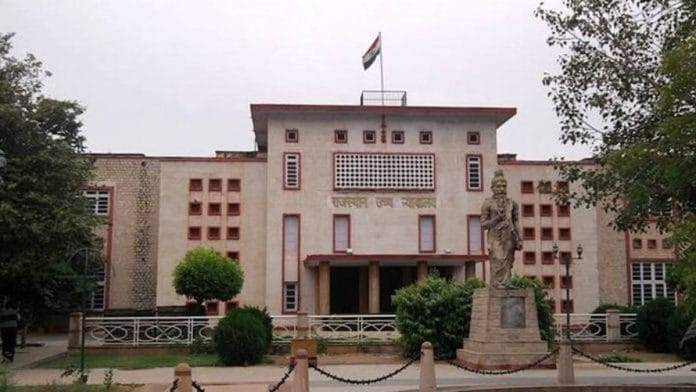New Delhi: The Rajasthan High Court last week pulled up members of the former royal family of Jaipur for continuing to use the titles “Maharaja” and “Princess” in court filings—honorifics that were abolished more than five decades ago and are now considered unconstitutional in official and public documents.
The matter before court related to a 2001 petition by the legal heirs of Sawai Jagat Singh, former Maharaja of Amber and Jaipur, and Maharaj Prithviraj, challenging house tax dues.
Justice Mahendar Goyal of the Jaipur bench of the high court ordered that the prefixes be removed from their plea within a week, else it “shall stand dismissed without reference to the court”. The one-page order, seen by ThePrint, came on the petitioners’ counsel seeking time to removes the titles from the petition.
This is not the first time the Rajasthan High Court has taken exception to the usage of such honorifics in court documents and the public domain.
Over the years, the court has repeatedly held that usage of royal titles violates the Constitution, specifically Articles 14, 18, and 363A, which guarantee equality, abolish titles, and end recognition of princely privileges.
In 2022, Justice Sameer Jain of the HC had said the use of salutary titles was prohibited in courts and the public domain after inputs were sought from the Centre and state. Taking note of legal provisions, the court had directed that the honorifics be dropped immediately.
What does the Constitution say on the usage of royal titles and what was the abolition of “privy purses”? And why does the issue continue to resurface?
ThePrint explains.
‘Hereditary titles conflict with principle of equality’
At the heart of the derecognition of titles is the 26th amendment to the Constitution in 1971, through which Parliament had introduced Article 363A.
Article 363A ended formal recognition of rulers and their successors in the former princely states, stripping titles such as “Maharaja” of legal status. It also abolished privy purses—guaranteed allowances given to rulers in return for integrating their states into independent India.
“Notwithstanding anything in this Constitution or in any law for the time being in force… the Prince, Chief or other person… on and from such commencement, cease to be recognised as such Ruler or the successor of such Ruler,” says clause (a) of Article 363A, abolishing the recognition to rulers and successors of such rulers by the President.
The amendment was introduced because the continued recognition of rulers and their privileges was considered incompatible with India’s constitutional commitment to equality.
“The concept of rulership, with privy purses and special privileges unrelated to any current functions and social purposes, was incompatible with an egalitarian social order,” the amendment had said in its object and reasons, which provide the scope of a law.
Interestingly, the amendment was brought in Parliament in the wake of the Madhav Rao Scindia case against the Centre, in which the Supreme Court had declared the 1970 presidential order to abolish the privy purses and titles of Indian princes as unconstitutional.
Since then, the apex court through multiple decisions has upheld the 26th amendment and emphasised that the abolition was necessary to preserve the integrity and fraternity of India.
“India has one common citizenship and every citizen should feel that he is Indian first irrespective of other basis. In this view, any measure at bringing about equality should be welcome,” the apex court had said in the Raghunath Ganpatrao case (1993), where the amendment had been challenged.
Complementing Article 363A are Articles 14 and 18, which guarantee equality before the law and abolish the use of titles.
“No title, not being a military or academic distinction, shall be conferred by the State,” clause 1 of Article 18 provides, further extending the equality doctrine in Article 14.
Courts have repeatedly noted that such titles of nobility conflict with the principle of equality, creating a separate, identifiable class with access to special privileges, which is not permissible.
“Hereditary titles of nobility conflict with the principle of equality insofar as they create a separate, identifiable class of people who are distinct from the rest of society and have access to special privileges,” the SC had observed in another case, noting the problems that such titles had created in pre-independence India.
In 2022, when the Rajasthan High Court had put up the legal provisions before the state government, it had agreed that such salutary titles are violative of the Constitution.
“The State of Rajasthan do endorse the view that use of prefixes and suffixes, other than military or academic distinction in terms of Article 18 of the Constitution of India, are abolished and are violative of Article 14 of the Constitution of India,” the court had then noted, directing parties in the case before it to refile without the use of prefixes.
(Edited by Nida Fatima Siddiqui)
Also Read: ‘Not a sword against dissent’: What Rajasthan HC said flagging ‘re-entry’ of sedition law






